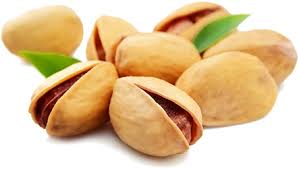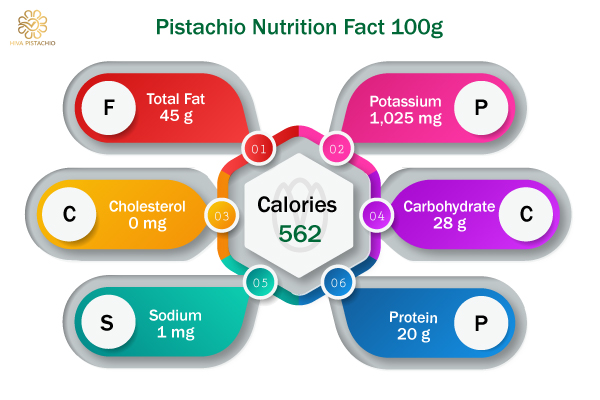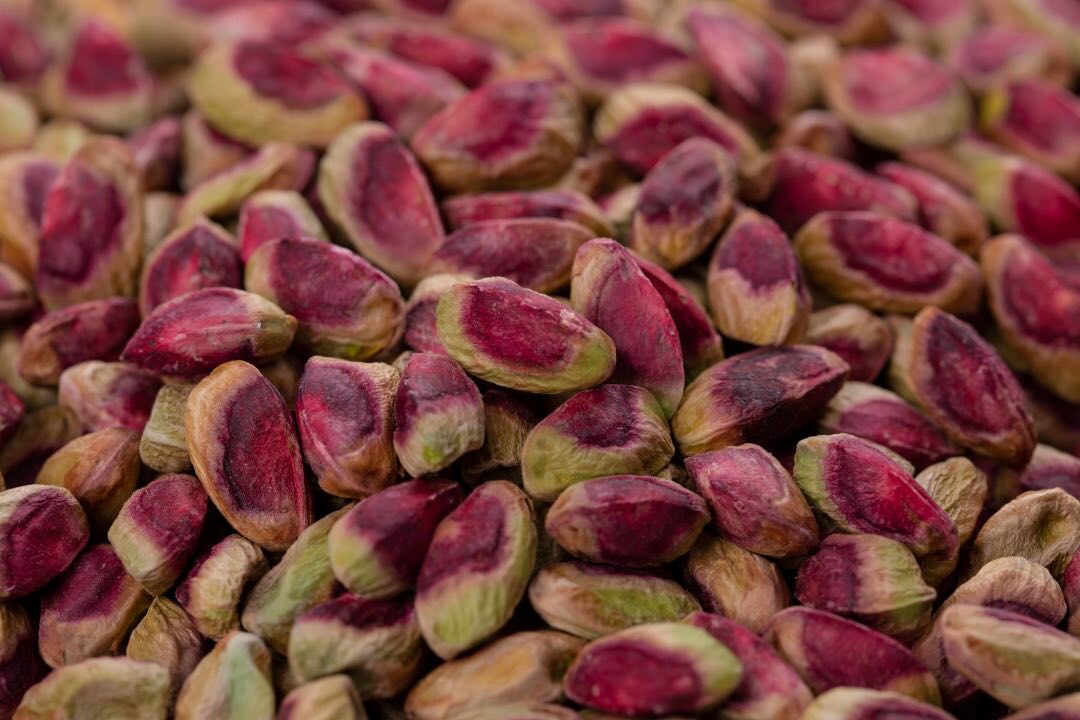Pistachios are globally renowned for their rich nutritional profile, encompassing proteins, healthy fats, vitamins, and minerals, often referred to as pistachio nutrition. Predominantly cultivated in Iran, these nuts are esteemed not only for their culinary versatility but also for their medicinal applications across different cultures. While excessive consumption can pose health risks, moderate intake of pistachios offers numerous health benefits. This article explores in-depth the nutritional components and health advantages associated with pistachios.
Pistachio nutrition facts 100g
Pistachios contain plenty of protein and other vital nutrients. They are also a source of healthful fatty acids and antioxidants.

The popular green nut is technically a seed of the pistachio tree, but people generally view it as a nut due to its appearance and feel.
- protein: 20.16 g
- fat: 45.32 g
- carbohydrate: 27.17 g
- fiber: 10.60 g
- sugar: 7.66 g
Healthful monounsaturated fatty acids and PUFAs make up most of the fat content in pistachios.
» Saturated Fat, 1.7g
» Polyunsaturated Fat, 3.5g
» Monounsaturated Fat, 7g
» Trans fat, 0g
While pistachios offer fewer minerals than some other nuts, they contain a substantial 1,025 mg of potassium per 100 g.
Other notable vitamins and minerals in pistachios include:
- calcium: 105 mg
- iron: 3.92 mg
- magnesium: 121 mg
- phosphorous: 490 mg

- Saturated fats benefits:
Pistachio has great benefits for the heart and circulatory system. Pistachios include Stearic and Lauric Acid and they can regulate cholesterol levels and prevent cardiovascular disease by reducing levels of lipoprotein.
- Polyunsaturated Fat benefits:
Reducing heart disease risk by having low LDL (bad) cholesterol. Cholesterol as a soft and waxy substance can cause clogged or blocked blood vessels. Polyunsaturated Fat causes lower LDL cholesterol.
- Monounsaturated Fat benefits:
Reducing the risk of heart disease and inflammation also helps with weight loss.
- Trans fat benefits:
Raising LDL cholesterol levels and lowering HDL (good) cholesterol levels. Trans fats increase the risk of heart disease and stroke, also they are associated with a higher risk of type 2 diabetes.
Based on what is mentioned above, pistachios are one of the lowest in fat in comparison to other nuts. They are also free from Trans-fat as they are unhealthy fat.

- Sodium, 1 mg
Per serving of pistachio includes 0.1 mg Sodium. In the case of salted or roasted verities, it may reach to 121 mg of sodium. Heart disease and high blood pressure may be increased by using too much sodium. The benefits of sodium are as follows:
- Sodium benefits:
Pistachios benefit in Helping the body`s fluid balance control, sending nerve impulses, and affecting muscle function. High blood pressure can be avoided and lowered by consuming less amount of sodium in diet.
- Potassium, 1,025mg
All nuts include some potassium, but the highest amount is for pistachio. The other high-potassium nuts are almonds, cashews, peanuts, hazelnuts, Brazil nuts, and chestnuts. Take a glance at potassium benefits below.
- Potassium benefits:
Regulating fluid balance nerve signals and muscle contractions. It also reduces blood pressure and water retention. stroke, osteoporosis, and kidney stones can also be prevented by having a high-potassium diet.
- Carbohydrate, 7 g
About 8 grams of carbohydrate in our body can be provided by a serving of pistachio, and also %12 of the daily value of fiber. Pistachios also are good sources of plant protein and healthy fats. To know more about carbohydrates, read the following paragraph.

- Carbohydrate benefits:
It is such as fuel for the kidney, heart, brain, central nervous system, and muscles. Carbohydrate includes fiber that aids in digestion helps feel full and keeps blood cholesterol levels in check.
- Dietary fiber 3 g
Pistachios are great source of fiber. Our body`s required amount of fiber can be provided by pistachio, it is about %12 of daily value. The benefits of dietary fiber are as bellow:
- Dietary fiber benefits:
Preventing stroke, diabetes, obesity, coronary heart disease, hypertension, and certain gastrointestinal diseases by having a dietary fiber diet. Lowering blood pressure and serum cholesterol levels.
Sugar, 2 g
- Due to the low glycemic index in pistachios, they do not increase blood sugar sharply. Having pistachio regularly may reduce diabetes risk and blood sugar level. Even significant drops in insulin levels and blood sugar were experienced by people who were suffering from prediabetes. They ate 2 ounces of pistachios every day. Sugar benefits include:
- Sugar benefits:
Essential for brain health, lowering blood pressure, decreasing heart attack risk, and making us less likely to develop dementia.
- Protein, 7 g
Pistachios are a good source of plant protein. Protein as one of the main required substances in our body, has many benefits, including:
- Protein benefits:
It serves as the main building block of muscles, bones, blood, skin, and cartilage, plays a role in making hormones, enzymes, and other body chemicals, and is essential for repairing and building tissues.
- Vitamins,
Pistachios as a healthy nut are also a great source of various vitamins including, vitamin A, vitamin C, Vitamin B6, vitamin D, and Cobalamin or Vitamin B12. The benefits of each one are mentioned below.
- Vitamin A benefits: %2.9
Protecting eye from night blindness and age-related decline, lowering the risk of certain cancers, supporting a healthy immune system, reducing the risk of acne, supporting bone health, and promoting healthy growth and reproduction.
- Vitamin C benefits: %2.7
Vital for the development, repair, and growth of all body tissues, involving in body functions such as absorption of iron, wound healing, formation of collagen, the immune system, and maintenance of bones, teeth, and cartilage.
- Vitamin B6 benefits:
Promoting brain health and reducing Alzheimer`s risk, preventing clogged arteries, reducing heart disease risk, improving mood and reducing depression symptoms, treating nausea during pregnancy, treating and preventing anemia by aiding hemoglobin production, and being useful in treating PMC symptoms.
- Cobalamin or Vitamin B 12 benefits:
Forming red blood cell and preventing anemia, preventing major birth defects, supporting bone health and preventing osteoporosis, reducing macular degeneration risk, improving mood and depression symptoms, and benefiting the brain by preventing the loss of neurons.
- Vitamin D benefits:
Maintaining teeth and bones health, supporting brain, immune, and nervous system health, regulating insulin levels and diabetes, and also supporting cardiovascular health and lung function.
- Calcium, %3
Almonds include the highest amount of calcium among nuts. Pistachio also contains about %3 of calcium in each serving. It can be concluded that pistachios have effects on bone density. Other beneficial results of calcium are mentioned below:
- Calcium benefits:
Building and maintaining strong bones is needed for muscles, heart, and nerves to work properly. Calcium along with Vitamin D protects our body against cancer, diabetes, and blood pressure. It is good for bone health.
- Iron, %6.2
In comparison of all popular nuts varieties, pistachio contains the highest amount of iron. It is about %6.2 per serving, nearly 4 times more than almonds or cashews. Iron`s benefits include:
- Iron benefits:
It is essential for immune system function, boosting hemoglobin, treating anemia, and eliminating fatigue and its sources.

Are Pistachios Good For Health?
Helpful to lose weight
As mentioned earlier, despite their high-fat and calorie-dense nature, pistachios promote weight loss or maintenance and reduce body mass index (BMI). This effect stems from the type of fat they contain rather than the amount.
According to studies, individuals who consumed pistachios as an afternoon snack for 12 weeks experienced a significant decrease in BMI and reduced triglyceride levels compared to those who ate an equivalent amount of pretzels.
In another study spanning 6 months, participants who obtained 20% of their daily calories from pistachios showed a decrease in waist circumference and lower LDL-cholesterol levels.
Additionally, a behavioral study revealed that eating in-shell pistachios led to 41% fewer calories consumed compared to shelled pistachios.
- Gut health benefits
Prebiotics is a type of fiber that feed good bacteria in the gut. As pistachios are a good source of prebiotics, having pistachios led to an increase in the number of good bacteria that fight short-chain fatty acid and increase lactic acid bacteria in the gut. Consumption of 3 ounces of pistachio daily increases helpful gut bacteria, much more than having almonds instead.
- Beneficial for heart health
Pistachios are nutrient-packed nuts, and most of the mentioned minerals have positive effects on heart health. Total cholesterol and LDL-cholesterol levels can be reduced by consuming pistachio daily. Pistachios improve HDL cholesterol levels and reduce blood pressure so they prevent heart disease.
It is also reported that the risk of cardiovascular disease will be reduced by having two portions of pistachio each day.
- Blood sugar balance
Pistachios may lower blood sugar and the risk of diabetes because they have a low glycemic index. The result of one study presented that having pistachios with high carbohydrate food may reduce blood sugar and glucose levels.
Fasting blood sugar can be reduced by consuming 25 grams of pistachio as a snack twice a day.
Therefore, if you are interested in controlling your blood sugar, you can easily add pistachio to your diet.
- Lower Gestational Diabetes
Some pregnant women suffer from gestational diabetes during their pregnancy. It causes high blood glucose that can affect both mother and baby health. based on the result of a study among pregnant women, having pistachio during pregnancy will significantly lower in blood sugar and insulin levels.
So the benefit of consuming pistachios during pregnancy is proved by scientific research.
- Beneficial for eye health
Pistachio nutrition facts reveal that they are rich sources of antioxidants lutein and zeaxanthin are good for eye health because they reduce the chances of developing AMD (age-related macular degeneration) and cataracts. One of the main reasons of blindness in the United States is cataracts and AMD.
To prevent developing of these eye disease, having a healthful diet including pistachio is recommended.
- Lowering cancer risk
The impact of fiber on the reduction of cancer risk is proven scientifically. Pistachios are high-fiber nuts, so they may reduce the cancer risk, especially colon cancer.
Some researches show that roasted pistachios have no effect on colon cancer risk.
- Help Erectile Dysfunction
Quality of life in men depends on several factors. Erectile dysfunction is a significant reason for decreased quality of life among men. There is also a link between heart attacks and impotence.
As part of pistachio nutrition, these nuts are high in antioxidants, which have a Viagra-like effect by increasing nitric oxide production. Consuming three to four handfuls of pistachios daily for three weeks can improve blood flow to the penis and result in significantly firmer erections.
Therefore, the positive effect of pistachio nutrition on sexual function is supported by several studies.
- Improving Brain Function
Being more focused and attentive at work depends on factors like eating protein, fiber, grains, and getting enough sleep. A study by Loma Linda University (LLU) found that consuming nuts regularly improves brain function and brainwave frequencies related to learning, memory, and cognition. Pistachios produced the greatest gamma waves compared with other nuts, which are essential for learning, perception, information retention, and cognitive processing.
Including pistachios in your daily diet can help your brain work better and improve your concentration.
- Prevent early aging
Vitamin E, Vitamin B6, and copper are essential minerals for protecting and improving skin and hair health. Vitamin E helps the skin stop aging and protects it from UV damage. Also Vitamin B6 improves the overall health of hair and skin, while copper is needed to produce skin elastin. All these nutrients are found in pistachios, making pistachio nutrition beneficial for preserving skin health.

Side effects of pistachio
Pistachios are rich sources of nutrition and they have lots of health benefits, but at the same time, there could be some side effects and risks if we have too many pistachios, especially roasted and salted types. Their side effects are mentioned briefly below:
- Gain weight
As mentioned above, pistachio nutrition is beneficial for weight management, but due to its delicious taste, specifically the salted type, overconsumption may lead to weight gain. To enjoy pistachios as a healthy snack, limit yourself to a handful daily.
- Potential high blood pressure
Our bodies require about 2000 mg of sodium each day, but excessive sodium intake is dangerous for our health. It can cause hypertension and high blood pressure, increasing the risk of cardiovascular diseases. While pistachio nutrition is generally beneficial, be cautious with salted varieties to avoid high sodium intake.
- Allergic reactions
If you are suffering from nuts allergy, you should avoid having pistachios, as you are most likely to be allergic to pistachios. Feeling itchy skin, pain, or in some cases difficulty in breathing are the most common symptoms of nuts allergy.
- Kidney Stone Risk
Individuals with kidney disease can consume moderate amounts of pistachios, but consuming large quantities can lead to the development of calcium oxalate and cystine kidney stones. Balancing pistachios’ nutrition with other dietary needs is important for those at risk.
- Digestive problems
The dietary fibers in pistachios are beneficial for digestion, but they also contain “Fructan,” which can cause digestive issues in individuals allergic to it. This can lead to digestive discomfort despite the positive aspects of pistachio nutrition.
- High Manganese Risk
Although manganese is helpful for health, overeating causes some health risks. Consumption of high-manganese food is not recommended for individuals who are suffering from chronic liver diseases, parkinsonism, polycythemia, and hypermanganesemia.
- Health risks of Pesticides and Insecticides
Pesticides and Insecticides are mostly used in pistachio orchards to protect them from pests’ attacks. Nausea and other allergic reactions are the symptoms of having pistachios which are highly exposed to pesticides and insecticides.
- Bacterium Salmonella Risk
Salmonella bacteria are harmful to health. If pistachios are contaminated with salmonella, they can be particularly dangerous for both adults and infants. If pistachios are roasted properly, they are safe to eat as the bacterium salmonella can be killed by roasting pistachios properly.
Conclusion
Pistachio nutrition provides a wealth of benefits, making it a valuable addition to a balanced diet. Including heart health, gut health, weight management, eye health, blood sugar balance, controlling diabetes risk, lowering cancer risk, sexual function, improving brain function, and preventing aging. Actually overeating them is not good for our health and may cause some problems. Therefore, moderate consumption of pistachios has no bad effects on our health.
